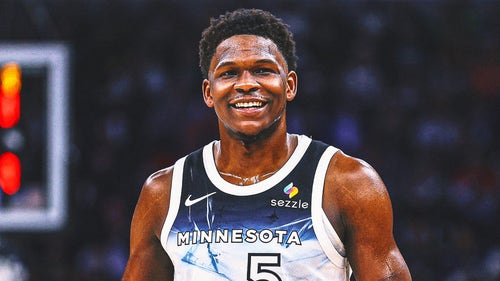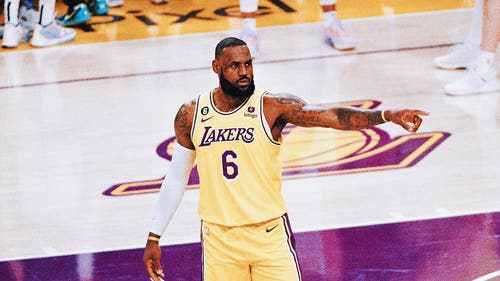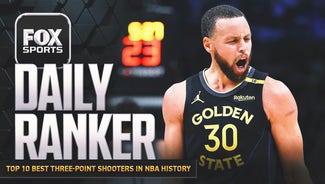
The 10 biggest draft mistakes in NBA history
On Thursday evening, the NBA will host its 70th annual rookie draft — a bonanza of overwrought drama, premature declarations about basketball ability, and awesome suits — and there are two guarantees so far:
1. Ben Simmons will go No. 1 overall to the Philadelphia 76ers.
2. At least one team will make an egregious, franchise-altering mistake.
The latter happens every year. With this many variables, it's inevitable — you never know when injury, apathy or a lack of skill will strike, turning what was supposed to be a top-notch prospect into a bust (who still achieved at the highest level while making millions of dollars). Mistakes are going to happen.
But these 10 errors stand out above all the others. One thing to note: They're all lottery picks in the top 10. Mistakes happen all over the draft, but wasting one of the top selections hurts a franchise that much more. Not everyone's willing to be awful for multiple years to try to land a star.
With the 13th pick in the 1996 draft, the Charlotte Hornets selected Kobe Bryant, then traded him to the Los Angeles Lakers for Vlade Divac

Were it not for the fog of history, the Hornets sending Kobe to the Lakers would be in the top five of this list. But we'll never know how realistic the idea of Bryant playing for the Hornets was. He said in 2000 that he gladly would have played for Charlotte, but there's always been a sense that he made it clear he was going to force his way to Los Angeles one way or another.
Kobe in Charlotte? The idea just doesn't make sense, so it doesn't quite make the cut for this list. Either way, it has to be mentioned, though.
With the third pick in the 1978 draft, the Pacers selected Rick Robey.
Players passed on: Bird. Just ... just Larry Bird (sixth overall pick).
1978 was a weird time. Jimmy Carter was in the White House, Grease was just hitting movie theaters, and NBA teams were allowed to draft a player who was headed back to college the next season.
Here's how it worked: Barring a hardship exemption, college players usually weren't NBA eligible until their college class graduated. Although Bird had technically just completed his junior year at Indiana State prior to the 1978 draft, he was in his fourth year of college; he'd originally enrolled at Indiana University before sitting out one year after a transfer to ISU. That made him draft eligibile, but he let the NBA know that he planned to finish his college career.
So maybe it's unfair to blame the Pacers for passing on Bird, since four other teams did as well. He was good as a junior in college, but this was before his otherworldly senior season and championship game against Magic Johnson. Still that's a lot of "Indiana" in the preceding paragraph, which makes sense, since it's Bird's home state. To think of what the Pacers might have been with Bird is almost too depressing. They could have changed basketball history if they had the patience. As Red Auerbach allegedly said, "Do you know how short a time a year is?"
With the first pick in the 1994 draft, the Milwaukee Bucks selected Glenn Robinson.
Players passed on: Jason Kidd (2), Grant Hill (3)
Robinson was a solid NBA player and a two-time All-Star. He also helped cause what amounted to a financial crisis for the league. In the days before a rookie salary scale, the Milwaukee Bucks signed Robinson to an absurd 10-year, $68 million contract in his first season. His rookie year paid Robinson $2.9 million. That might not seem that bad by today's standards, but it was about 18 percent of the salary cap in 1994-95. By contrast, last year's No. 1 pick earned 8 percent of the salary cap.

Greatest. Jacket. Ever. (Getty Images)
The financial negligence alone would be enough to put Robinson on this list. Unfortunately for the Bucks, the hits kept coming. Kidd and Hill shared Rookie of the Year honors in 1994-95; Kidd went on to a lengthy career that included three Finals appearances and one championship, and Hill nearly became the "next Michael Jordan" before injuries robbed him of his athleticism and forced him to become a role player later in his career. Both are likely Hall of Famers, if not locks to make it to Springfield. Robinson, meanwhile, is a cautionary tale.
Anyway, speaking of Jordan ...
With the first pick in the 2001 draft, the Washington Wizards selected Kwame Brown.
Players passed on: Pau Gasol (3), Shane Battier (6), Joe Johnson (10), Richard Jefferson (13), Zach Randolph (19), Tony Parker (28)
So we're in full agreement that LeBron James is a better general manager than His Airness, right? At least LeBron was able to build a title contender. Jordan? Well, Jordan was in the front office (there's some debate about whether he made the actual pick, although it's his former agent fostering the discussion) when the Wizards drafted Kwame, then he destroyed the young big man's spirit when he took the floor for Washington in his second comeback, because the man was often a complete jerk. You're lionizing a jerk, people.
But the Brown selection isn't the world-ending nightmare some make it out to be. For one, he wasn't a complete stiff. Brown played in more than 600 games and averaged 22.1 minutes. More importantly, however, the 2001 draft wasn't all that strong. Who knows how Parker would have developed outside of San Antonio without Tim Duncan leading him to the promised land, and Randolph had to switch teams three times to settle into his role in the NBA.
Gasol? I mean, OK. That one would have been nice. Imagine Pau having a career in which he plays with both Jordan and Kobe. Good times. Good times.
With the second pick in the 2005 draft, the Atlanta Hawks selected Marvin Williams.
Players passed on: Chris Paul (3), Deron Williams (4)
You know what's not good times? Needing a point guard because Tyronn Lue is your best option, then taking Williams instead of one of the greatest point guards ever. Or Deron Williams! He's great, too. Well, he was, anyway. We used to talk about who was better, D-Will or CP3. That happened, I swear.
Regardless, the Hawks really could have used an All-Star point guard in 2005. Williams has grown into a solid rotation player, and he'll have a long career. But his story is also a fable on the perils of prioritizing versatility over true skill.
With the first pick in the 1998 draft, the Los Angeles Clippers selected Michael Olowokandi.
Players passed on: Vince Carter (5), Dirk Nowitzki (9), Paul Pierce (10), Tyronn Lue (23), literally anyone else because Olowokandi had the lowest value in the draft class
To all the NBA teams with draft picks in Thursday's draft (so not you, New York Knicks): DO NOT TAKE A GUY JUST BECAUSE HE IS TALL.
Sure, if everything else is equal, then take the big man. Draft a player just because he's tall, though, and you get the Kandi Man. Like Kwame Brown, Olowokandi was serviceable at times, playing for nine seasons and averaging 8.3 points and 6.8 rebounds per game. Unlike Brown, the list of players taken after Olowokandi includes two surefire Hall of Famers and champions (Nowitzki and Pierce) and arguably the greatest dunker ever (Carter, naturally) and a future championship-winning coach (congrats, Tyronn Lue!).
With the first pick in the 1972 draft, the Portland Trail Blazers selected LaRue Martin.
Players passed on: Bob McAdoo (2), Julius Erving (12)
Before Anthony Bennett was the worst player ever picked No. 1 overall, there was LaRue Martin.
Martin held the distinction of being the least productive No. 1 pick until Bennett sadly surpassed him for that distinction. Martin averaged 5.3 points, 4.6 rebounds and 0.7 assists in 271 games during his four seasons with the Blazers. And just to twist the knife a little, he retired a year before the Blazers won the 1977 NBA championship. Martin went on to work for Nike after his playing days were over, as well as assisting in your package disbursement needs as a member of team UPS.
I won't go over Dr. J's accomplishments, because that would be insulting to you, dear reader. You know of Dr. J's legend. I will, however, share this video, because we can always use more Dr. J:
But don't sleep on Bob McAdoo. The Hall of Famer made five consecutive All-Star games in the 1970s and won two NBA titles with the Showtime Lakers. He also ranks 30th all time in career regular-season scoring average (22.1), with 17,357 more regular-season points than LaRue.
One more thing: Blazers fans, I apologize in advance. Things are going to get bumpy for you — but not until after this next entry!
With the second pick in the 2003 draft, the Detroit Pistons selected Darko Milicic
Players passed on: Carmelo Anthony (3), Chris Bosh (4), Dwyane Wade (5)
Twenty years from now, people will be doing lists like these on the neuro-internet we all have installed into our brains, and they still will be talking about NBA teams drafting big men too soon.
You read the quotes, and you wince at how the confidence comes off as arrogance in retrospect (via ESPN.com):
That's nothing worse than the typical top-three prospect might say, of course. Still, it's painful coming from a player drafted ahead of guys like LeBron's super-best-friends — 'Melo, D-Wade and Bosh — who might have lifted the Pistons to a second title in the 2000s. The year Detroit drafted Darko, the team knocked off the Shaq-Kobe Lakers for the 2004 championship. The next season, the Pistons advanced to the Finals and lost to the San Antonio Spurs. Then the next three seasons, Detroit lost in the Eastern Conference finals.
It's a rather impressive stretch of basketball, considering that the Pistons received an average of 1.6 points, 1.2 rebounds and 0.2 assists over 96 games from a No. 2 overall pick who would later decide that punching people in the face was a better career path than basketball.
Then again, Darko has his own farm these days, and that sounds pretty sweet. So who am I to judge?
With the first pick in the 2007 draft, the Portland Trail Blazers selected Greg Oden.
Players passed on: Kevin Durant (2), Al Horford (3), Joakim Noah (9)
It wasn't supposed to happen again. For the Blazers, watching a big man crumble while a wing turned into one of the game's greatest players was cruel deja vu.
Oden had all the tools to be a fantastic modern big man. He looked like a real rim protector. He tore up the glass. And he showed a decent post game combined with a solid knack for operating as a finisher and passer in the pick-and-roll. He wasn't a lumbering oaf drafted too soon because of his size.
He also wasn't the consensus No. 1 pick history might make him out to be. There was genuine debate about whether Oden or Durant would end up in Portland, with the most common knock on Durant being his relatively thin stature. In retrospect, it seems almost morose that KD was the one facing questions about his ability to hold up to the rigors of an NBA season.
After two injury-plagued seasons with the Blazers, Oden missed three straight seasons. He attempted a brief comeback with the Miami Heat in 2013-14 that included brief appearances in three playoff games during the Heat's run to the Finals. Oden signed a deal to play in China last year; he was cut in February, yet he sounds open to the idea of continuing to play basketball (via Cleveland.com):
With the second pick in the 2009 draft, the Memphis Grizzlies selected Hasheem Thabeet.
With the fifth and sixth picks in the 2009 draft, the Minnesota Timberwolves selected Jonny Flynn and Ricky Rubio.
Players passed on: James Harden (3); Stephen Curry (7)
Here's the thing about Thabeet: He's tall.
That's it. He's just really tall. To be fair, extraordinary height will get you pretty far in basketball. The Grizzlies really could have used a wing in this draft, though, and there were plenty of talented guards and small forwards available. Harden wasn't a consensus top-three pick, necessarily, but there were clear indications of his offensive talent; ESPN.com gave the Thunder an A- for their 2009 draft, and Bleacher Report handed out a B+, even if both thought Rubio (?!?) made more sense.
So Thabeet was a bad choice. But goodness gracious, passing on the two-time MVP forever will burn in the souls of Minnesota Timberwolves fans. They like Rubio, for the most part, and they should. He's a fine point guard. But Curry is a little bit better than fine. Plus, if they'd drafted him rather than Rubio or, even better, Flynn, then they'd never have to hear about passing on Curry ever again. That kind of tranquility is priceless.

My mistake. Kicking people in the face, not punching. (Getty Images)
With the second pick in the 1984 draft, the Portland Trail Blazers selected Sam Bowie.
Players passed on: Michael Jordan (3), Charles Barkley (5), John Stockton (16)
I mean, what do you say? Maybe the Houston Rockets kind of regret passing on Jordan to take Hakeem Olajuwon, but at least they got Hakeem freaking Olajuwon out of the draft, plus the two titles the Dream won in the mid-90s. The Blazers — seriously, I'm so sorry, Portland, I didn't mean for this to shake out like, well, this — got Bowie.
There's almost no point in pointing out how much it sucks to pile on with the big man these days. Every time a draft bust article happens, there he is. There are documentaries about that night, documentaries about the anniversary, documentaries about how he feels about everything; eventually, we're going to get a documentary about a documentary about a documentary about Bowie, and the whole draft industrial complex will collapse in on itself.
Until then, enjoy Thursday's draft, everyone!










